Unit 3 my school calendar A Let's learn
- 格式:pptx
- 大小:10.40 MB
- 文档页数:19
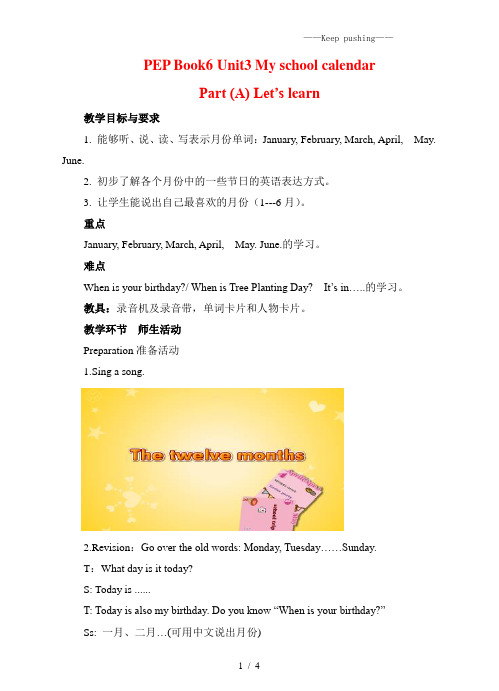
PEP Book6 Unit3 My school calendarPart (A) Let’s learn教学目标与要求1. 能够听、说、读、写表示月份单词:January, February, March, April, May. June.2. 初步了解各个月份中的一些节日的英语表达方式。
3. 让学生能说出自己最喜欢的月份(1---6月)。
重点January, February, March, April, May. June.的学习。
难点When is your bir thday?/ When is Tree Planting Day? It’s in…..的学习。
教具:录音机及录音带,单词卡片和人物卡片。
教学环节师生活动Preparation准备活动1.Sing a song.2.Revision:Go over the old words: Monday, Tuesday……Sunday.T:What day is it today?S: Today is ......T: Today is also my birthday. Do you know “When is your birthday?”Ss: 一月、二月…(可用中文说出月份)教学环节师生活动Presentation新知呈现1.出示March图片T:My birthday is in March.领读、板书March.T:When is your birthday?S:My birthday is in January.出示January图片明确告知学生在只有月份的情况下只能用介词in2.同样方法学习Febray,April,May,June.3.引导学生自己说出句子如:Februay,February. My birthday is in February.引导学生找出1---6月份中的节日及自己能用英文读出的名称,如:Children’s Day 等。
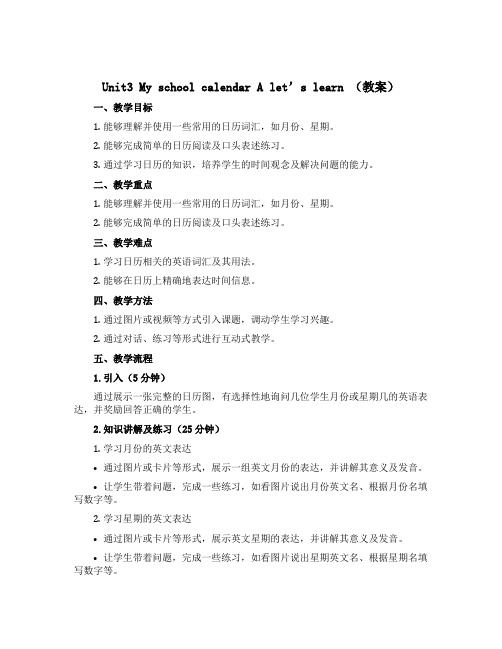
Unit3 My school calendar A let’s learn (教案)一、教学目标1.能够理解并使用一些常用的日历词汇,如月份、星期。
2.能够完成简单的日历阅读及口头表述练习。
3.通过学习日历的知识,培养学生的时间观念及解决问题的能力。
二、教学重点1.能够理解并使用一些常用的日历词汇,如月份、星期。
2.能够完成简单的日历阅读及口头表述练习。
三、教学难点1.学习日历相关的英语词汇及其用法。
2.能够在日历上精确地表达时间信息。
四、教学方法1.通过图片或视频等方式引入课题,调动学生学习兴趣。
2.通过对话、练习等形式进行互动式教学。
五、教学流程1.引入(5分钟)通过展示一张完整的日历图,有选择性地询问几位学生月份或星期几的英语表达,并奖励回答正确的学生。
2.知识讲解及练习(25分钟)1.学习月份的英文表达•通过图片或卡片等形式,展示一组英文月份的表达,并讲解其意义及发音。
•让学生带着问题,完成一些练习,如看图片说出月份英文名、根据月份名填写数字等。
2.学习星期的英文表达•通过图片或卡片等形式,展示英文星期的表达,并讲解其意义及发音。
•让学生带着问题,完成一些练习,如看图片说出星期英文名、根据星期名填写数字等。
3.日历阅读及口头表述练习•展示一个含有日期信息的日历,并通过简短而生动的对话引导学生理解日历上时间信息的表达方式。
•分角色进行对话,让学生模仿角色下达一些简单的指令,如“I have to go to the doctor on the 23rd of March.”等。
•通过团队竞赛的形式让学生口头表述一些特定日期上的计划,竞相展示他们的表述技巧及句型运用能力。
3.课堂小结(5分钟)对本节课学习的内容进行概括,引发学生对时间的进一步思考及探究。
4.作业布置(5分钟)布置听写作业,要求学生根据老师给出的口头指令,写出对应的英文日期。
并结合课下个人生活实际,完成一份自己的日历,记录一周内每天的行程。

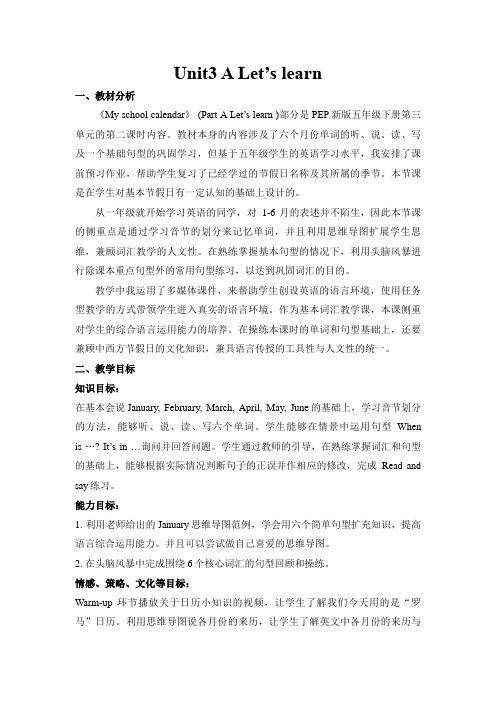
Unit3 A Let’s learn一、教材分析《My school calendar》(Part A Let’s learn )部分是PEP新版五年级下册第三单元的第二课时内容。
教材本身的内容涉及了六个月份单词的听、说、读、写及一个基础句型的巩固学习,但基于五年级学生的英语学习水平,我安排了课前预习作业,帮助学生复习了已经学过的节假日名称及其所属的季节。
本节课是在学生对基本节假日有一定认知的基础上设计的。
从一年级就开始学习英语的同学,对1-6月的表述并不陌生,因此本节课的侧重点是通过学习音节的划分来记忆单词,并且利用思维导图扩展学生思维,兼顾词汇教学的人文性。
在熟练掌握基本句型的情况下,利用头脑风暴进行除课本重点句型外的常用句型练习,以达到巩固词汇的目的。
教学中我运用了多媒体课件,来帮助学生创设英语的语言环境,使用任务型教学的方式带领学生进入真实的语言环境。
作为基本词汇教学课,本课侧重对学生的综合语言运用能力的培养。
在操练本课时的单词和句型基础上,还要兼顾中西方节假日的文化知识,兼具语言传授的工具性与人文性的统一。
二、教学目标知识目标:在基本会说January, February, March, April, May, June的基础上,学习音节划分的方法,能够听、说、读、写六个单词。
学生能够在情景中运用句型When is …? It’s in …询问并回答问题。
学生通过教师的引导,在熟练掌握词汇和句型的基础上,能够根据实际情况判断句子的正误并作相应的修改,完成Read and say练习。
能力目标:1. 利用老师给出的January思维导图范例,学会用六个简单句型扩充知识,提高语言综合运用能力。
并且可以尝试做自己喜爱的思维导图。
2. 在头脑风暴中完成围绕6个核心词汇的句型回顾和操练。
情感、策略、文化等目标:Warm-up环节播放关于日历小知识的视频,让学生了解我们今天用的是“罗马”日历。
利用思维导图说各月份的来历,让学生了解英文中各月份的来历与罗马神话有关,不同的月份对应不同的“神”。

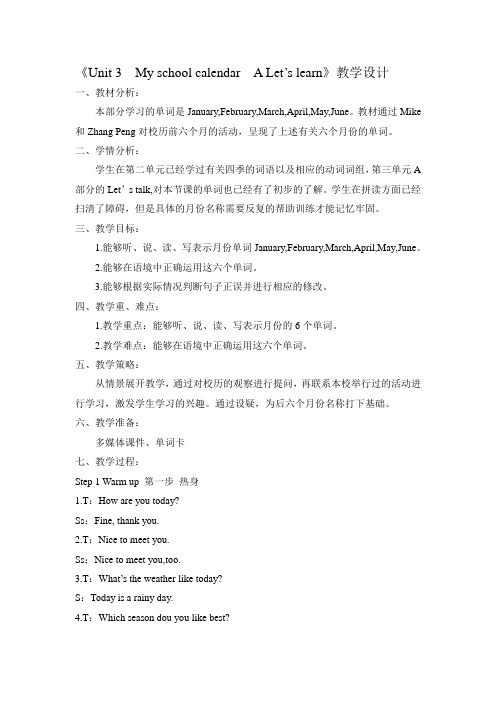
《Unit 3 My school calendar A Let’s learn》教学设计一、教材分析:本部分学习的单词是January,February,March,April,May,June。
教材通过Mike 和Zhang Peng对校历前六个月的活动,呈现了上述有关六个月份的单词。
二、学情分析:学生在第二单元已经学过有关四季的词语以及相应的动词词组,第三单元A 部分的Let’s talk,对本节课的单词也已经有了初步的了解。
学生在拼读方面已经扫清了障碍,但是具体的月份名称需要反复的帮助训练才能记忆牢固。
三、教学目标:1.能够听、说、读、写表示月份单词January,February,March,April,May,June。
2.能够在语境中正确运用这六个单词。
3.能够根据实际情况判断句子正误并进行相应的修改。
四、教学重、难点:1.教学重点:能够听、说、读、写表示月份的6个单词。
2.教学难点:能够在语境中正确运用这六个单词。
五、教学策略:从情景展开教学,通过对校历的观察进行提问,再联系本校举行过的活动进行学习,激发学生学习的兴趣。
通过设疑,为后六个月份名称打下基础。
六、教学准备:多媒体课件、单词卡七、教学过程:Step 1 Warm up 第一步热身1.T:How are you today?Ss:Fine, thank you.2.T:Nice to meet you.Ss:Nice to meet you,too.3.T:What’s the weather like today?S:Today is a rainy day.4.T:Which season dou you like best?S:Spring/Summer/Autumn/Winter.Step 2 Preview 第二步复习引入1.T:Look at the creen.Go over the old words:Monday,Tuesday,Wednesday…2.T:What day is it today?Ss:Today is Thursday.3.T:Do you know “When is your birthday?” It’s in…Step 3 Presentation 第三步讲授新课T:Let’s begin a new Unit and lesson.板书课题:Unit 3 My school calendar A Let’s learnT:Open your English books.Turn to page 25.A Let’s learn(一)教学新单词T:We have some new words and sentences.Are you ready?Ss:Yes.1.教学单词January(1)T:Look at this school calendar.What holidays do you see?Ss:元旦、寒假(2)师领读New Year’s Day和winter vacation(3)生齐读Read after me,please.Read loudly.(4)T:When are New Year’s Day and winter vacation?Ss:一月(5)师领读January和(Jan.)(6)生齐读Read after me please.Read loudly.(7)指名学生读Who can read the word?You please.(8)让男孩齐读,让女孩齐读。

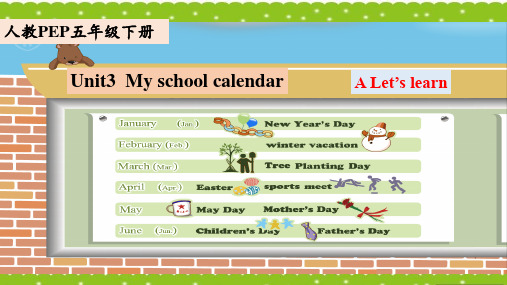

Unit 3 My school calendar PA Let's learn 教案教学目标:知识目标:1. 能理解并熟练运用下列重点词汇:calendar, special, event, concert, competition, field trip, sports day.2. 初步掌握日常学校生活中常见的各种活动。
能力目标:1. 能够读懂日历并描述日历上的重要事件。
2. 能够简单地口头表达个人日常安排及日历上的活动。
情感目标:1. 培养学生对学校分期分批安排的各项活动的认识和体验,感受集体活动给自己带来的快乐。
2. 培养学生集体协作、适应学校生活的能力。
教学重点:1.掌握本周以及未来数周学校日程安排,了解各项活动的基本内容。
2.熟悉日历表达法和学校活动。
教具准备:卡片,单词卡片,翻盘演示歌曲。
教学过程:Step 1. Warm-up1. Greeting.2. Daily report and weather forecast.T: Hello, boys and girls. Welcome to the class. How are you today?Ss: Fine, thank you. And you?T: I'm fine, too. Now it's time for our daily report. Who wants to be the first one to report the weather today?3. Talk about the school calendar.T: Boys and girls, do you know what a school calendar is?Ss: Yes, it's a schedule of events for the school year.T: Very good. Now let's talk about the school calendar. What are some of the special events on the school calendar?Ss: Sports day, field trip, concert, competition.Step 2. Presentation1. Look at the school calendar.T: Now, let's have a look at our school calendar. Here is our school calendar. What's the date today?Ss: Today is …T: Yes, and what's the weather like today?Ss: It's …2. Read the school calendar.T: Now, let's read our school calendar together. (Teacher points to each date and reads the events.) August 23rd, regular school day. August 24th, field trip to themuseum. August 25th, sports day. August 26th, regular school day.Step 3. Practice1. Match the words and the pictures.T: Now let's do a matching exercise. Please match the words and the pictures. (Teacher shows pictures and words like calendar, special, event, concert, competition, field trip, sports day, etc.)2. Talk about the events on the school calendar.T: Now, let's talk about the events on our school calendar. (Teacher shows a date and asks students what event is on that date.) For example, what's on August 23rd?Ss: It's a regular school day.(Teacher continues with other dates.)3. Do a role play.T: Now, let's do a role play. You are parents or teachers, and you are asking a student, Li Lei, about his school schedule. Li Lei, please tell us your school schedule.Li Lei: Monday, regular school day. Tuesday, field trip to the museum. Wednesday, competition. Thursday, regular school day. Friday, sports day.T: Very good. Now, students, please make your own school schedule with a partner, and then tell the class what your schedule is.Step 4. Production1. Sing a song.T: Now, let's sing a song. This song is about the daysof the week. Please listen to the song first, and then sing it with me together.(Teacher plays the song and sings along with the students.)2. Do a group activity.T: Now, let's do a group activity. Please work ingroups of 4 or 5. Each group needs to make a schoolcalendar for the next month. You can use the cards and pictures we have learned in class. After you finish, please show your calendar to the class.Step 5. Homework1. Review the words we learned today.2. Make a diary for the next week using the words we learned today.教学反思:本课时让学生们从日历这个熟悉的物品入手,学习说说学校日程安排并配合实物卡片帮助学生理解词汇。

Unit 3 My School Calendar Part A Let’s LearnIntroductionThe following is a lesson plan for the fifth grade class, based on the PEP (People’s Education Press) version of the English curriculum. It focuses on Unit 3: My School Calendar Part A Let’s Learn. This lesson plan aims to enable students to learn and use vocabulary about school activities and events, as well as to use simple present tense to describe their own schedule.ObjectivesAt the end of this lesson, the students will be able to:•Identify and use basic vocabulary related to school activities and events•Describe their own daily schedule using simple present tense•Communicate effectively in English by participating in class activities and giving simple instructionsMaterials•The coursebook for fifth grade students•Whiteboard, markers, and chalk•Flashcards with pictures of school activities•Worksheets for practice exercisesProcedure1. Warm-up•Greet students and ask about their day•Use flashcards to review previously learned vocabulary related to school, such as “classroom,” “teacher,” “student,” “desk,” etc.•Ask students to describe their school day, using the vocabulary they have learned so far.2. Presentation•Introduce the new vocabulary words for the lesson and provide definitions and examples. These words include “football match,”“basketball game,” “Spring Festival Gala,” “arts festival,” “open day,” “sports meeting,” “parents’ meeting,” etc.•Use flashcards or realia (e.g. pictures or items from past events) to illustrate each term.•Model how to use simple present tense to describe schedules. For example, “I have a basketball game on Friday afternoon.”3. Practice•Have students work in pairs to practice using the new vocabulary words and simple present tense. They can take turns describing their own schedules to each other.•As a class, play a game of “Simon Says” using the new vocabulary words. For example, “Simon says, ‘Stand up if you have a sports meeting next week.’”•Use worksheets to provide additional exercises for practice.4. Production•Have students work in groups to plan and organize a school event based on the vocabulary words they have learned. They can create posters or pamphlets to promote their event and present it to the class.•As a class, plan a hypothetical school event (e.g. a charity run, a talent show, or a cultural fair) using the vocabulary words and simple present tense.5. Summary and Homework•Review the new vocabulary terms and simple present tense.•Assign homework to students, such as writing a journal entry about their schedule for the upcoming week or creating a comic strip using the vocabulary words and simple present tense.•Encourage students to practice speaking and using English outside of class whenever possible.ConclusionThis lesson plan follows the PEP curriculum for fifth grade students, taught through Unit 3: My School Calendar Part A Let’s Learn. The plan focuses on vocabulary related to school events and activities, as wellas the use of simple present tense to describe schedules. The planincludes various activities to promote engagement and encourage students to participate and use English effectively.。

